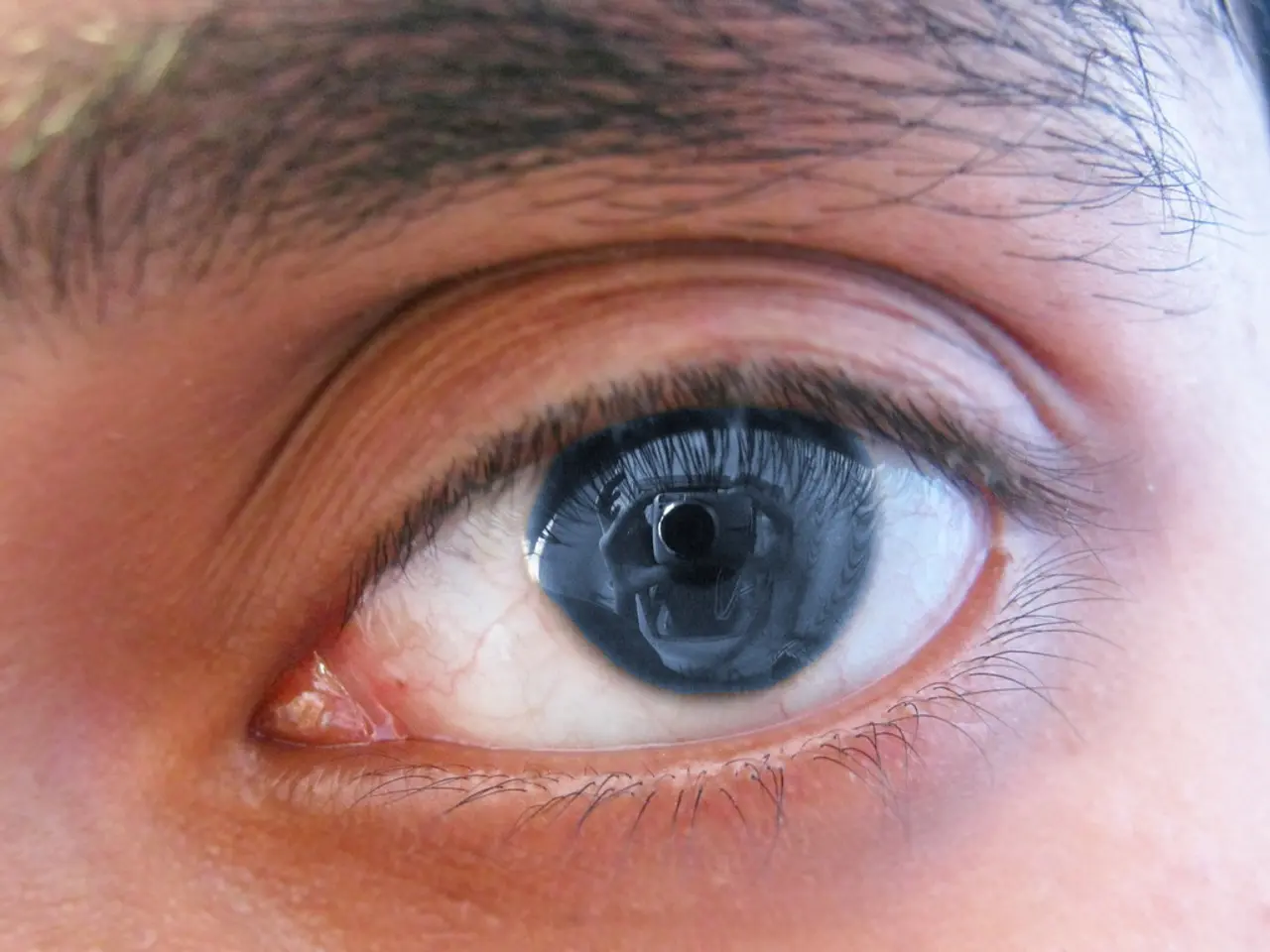Advanced Stage of Eye Cancer: Prognosis, Expansion, Signs, and Further Details
In the world of eye cancer, the most common staging system used for various types, including uveal melanoma, is the TNM system. This system describes the size and extent of the primary tumor, whether the cancer has spread to nearby lymph nodes, and whether it has metastasized to distant parts of the body.
When cancer reaches stage 4, it typically involves liver metastasis. At this stage, the cancer can be any size, and it may or may not have spread to nearby lymph nodes, or there may be metastasis to distant areas.
Common treatment options for stage 4 eye cancer (uveal melanoma with metastasis) include radiation therapy, chemotherapy, surgery, immunotherapy, targeted therapies, and palliative care. Given the high rate of liver metastases in stage 4 eye cancer, liver-directed treatments are a significant focus.
Radiation therapy is used primarily for local control, but for metastatic uveal melanoma, especially in the liver, specific approaches such as transarterial radioembolization (TARE) with yttrium-90 beads are employed to target liver tumors directly while sparing healthy tissue. External beam radiation may also be applied for some local lesions.
Chemotherapy, when systemic, has limited efficacy in uveal melanoma. Instead, liver-directed chemotherapy via embolization techniques such as transarterial chemoembolization (TACE) or regional-isolation perfusion (e.g., isolated hepatic perfusion [IHP] or percutaneous hepatic perfusion [PHP]) allows high-dose chemotherapy (often melphalan) to be delivered directly to liver metastases. PHP, marketed as HEPZATO KIT, is a less invasive and repeatable option approved for metastatic uveal melanoma with liver involvement.
Surgery is rarely curative in metastatic stage 4 disease but may be used to remove isolated metastases in select patients or for liver metastases when feasible. Surgical removal of primary eye tumors typically occurs earlier in the disease prior to metastasis.
Immunotherapy with checkpoint inhibitors, effective in cutaneous melanoma, has shown poor response rates (~18%) in uveal melanoma. A newer promising immunotherapy is the bi-specific T-cell engager tebentafusp, approved for metastatic uveal melanoma in patients with the right HLA subtype; it has improved overall survival despite a modest 9% response rate. Emerging cell therapies, such as IMA203 PRAME cell therapy, are under investigation showing encouraging results in metastatic cases.
Targeted therapies have limited established roles currently since uveal melanoma has distinct molecular characteristics compared to skin melanoma, making many common systemic targeted agents less effective. Research continues into this area.
Palliative care focuses on managing symptoms and maintaining quality of life, especially since metastatic uveal melanoma is often aggressive and difficult to cure. This includes pain control, treating complications, and supporting daily function.
Symptoms of stage 4 eye cancer include eye pain, visible lump or mass in the eye, redness or swelling of the eye, blurred or distorted vision, loss of vision, eye fluid and discharge, light sensitivity, changes in the size or shape of the pupil, pressure in the eye or face, bulging of the eye, headaches, weakness, fatigue, and weight loss.
The outlook for stage 4 eye cancer depends on several factors, including the type of eye cancer, its location, and how much it has spread. Factors that can affect the outlook include the location of the cancer, whether it has spread outside the eye, tumor size, cell type, mitotic count, chromosome changes, genetic changes, tumor tissue classification, age, and a person's immune system function.
The 5-year survival rate for the last stage of eye melanoma is 16%. In the last stage, the cancer has spread beyond the eye to regional lymph nodes and distant areas, including the bone, liver, and lungs.
In summary, liver-directed therapies (embolization, perfusion, radioembolization) combined with newer immunotherapies like tebentafusp represent the forefront of treatment for stage 4 metastatic uveal melanoma, while systemic chemotherapy and traditional immunotherapy have limited effectiveness. Surgery and radiation may be used for local control or symptom relief, and palliative care is important throughout.
- Science continually evolves in the understanding and treatment of various medical conditions, such as cancer, respiratory conditions, digestive health, eye health, hearing issues, and mental health.
- Health and wellness is a broad spectrum that encompasses not only physical health but also autoimmune disorders, cardiovascular health, psoriasis, and breast cancer.
- Finance plays a significant role in ensuring accessibility to essential medical treatments and supporting caregivers during challenging health journeys.
- Skin conditions, such as eczema or psoriasis, can impact an individual's self-confidence and daily life, necessitating various remedies and treatments.
- Cybersecurity is important in protecting sensitive health data, ensuring privacy and maintaining trust in the digital healthcare landscape.
- Lifestyle choices like diet, exercise, and stress management can positively affect general health and potentially reduce the risk of developing certain medical conditions.
- Fashion and beauty products can cater to those battling cancer, offering alternatives that accommodate medical-related changes or offer comfort during treatment.
- Food and drink choices can contribute to overall wellness, promoting healthy digestion, supporting eye health, and fostering cardiovascular health.
- Family dynamics often shift during challenging health circumstances, necessitating open communication, understanding, and empathy.
- Investing in stocks, bonds, or real estate can provide financial stability and independence, easing the burden of medical expenses and caregiving costs.
- Home and garden projects can offer therapeutic benefits, helping individuals cope with stress and maintain a sense of normalcy during difficult health journeys.
- Businesses must comply with safety regulations and health protocols to protect employees and customers during a pandemic or other health crises.
- Personal finance management is crucial for budgeting, saving, and making informed decisions about investments, insurance, and planning for the future.
- Real estate trends can impact property values and, in turn, affect personal finances, necessitating careful consideration and research.
- Technology continues revolutionizing the healthcare industry, from medical-equipment advancements to telemedicine and AI diagnostics.
- Relationships can provide emotional support, encouragement, and a sense of community during challenging health circumstances.
- Pets can offer companionship, reducing stress and promoting emotional well-being for individuals battling cancer or other medical conditions.
- Travel options, such as cruises or vacations, can be adapted for the disabled, offering opportunities for relaxation and personal growth.
- Cars can accommodate modifications for individuals with mobility issues, making transportation easier and more accessible.
- Books chronicling personal health journeys or offering tips for coping with stress can serve as valuable resources for those facing medical challenges.
- Migration patterns can be influenced by factors such as access to healthcare, healthcare cost, and quality of life.
- Education and self-development can empower individuals, enhancing career opportunities and personal growth.
- Mindfulness practices, such as meditation or yoga, can help manage stress, promote relaxation, and benefit mental health.
- Shopping experiences can be tailored to cater to those with specific needs or preferences, such as sustainable clothing, eco-friendly products, or health supplements.
- Car maintenance can be outsourced to professionals, ensuring vehicles are safe, reliable, and running efficiently.
- Social media platforms connect individuals, fostering communities, sharing advice, and offering support during challenging health journeys.
- Movies and TV shows can offer entertainment while addressing serious topics, such as cancer, politics, or war, raising awareness and encouraging empathy.
- Music can offer emotional comfort, promoting relaxation and serving as a coping mechanism for stressful situations.
- Politics can impact health policies, influencing the availability and affordability of healthcare services.
- Online education opportunities, ranging from general subjects to specialized topics like medical science or investing, can be pursued from the comfort of home, flexibly fitting into busy lifestyles.






